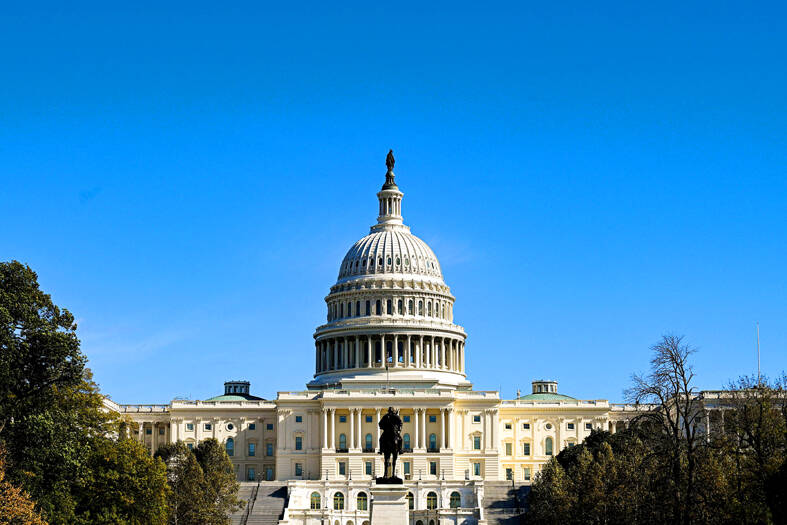The US Senate on Tuesday unanimously passed the Taiwan Assurance Implementation Act, aimed at broadening exchanges between Taiwanese and US officials.
The bill — which would amend the 2019 Taiwan Allies International Protection and Enhancement Initiative Act and the 2020 Taiwan Assurance Act — is awaiting US President Donald Trump’s signature to become law.
The US House of Representatives in 2023 passed a previous iteration of the proposal, which stalled in the Senate.

Photo: Reuters
US Republican Senator John Cornyn, who also cosponsored the bill, said it would require the US Department of State to regularly revise its policy guidelines on Taiwan to deal with the threat of Chinese military action.
The House version of the bill — which the chamber passed in May — was backed by US representatives Ann Wagner, a Republican, and Democrats Ted Lieu and Gerry Connolly.
Connolly passed away in May.
The legislation would require the State Department to update and review its guidance on Taiwan every two years and deliver a report to Congress within 90 days, with the goal of removing self-imposed limits on bilateral exchanges.
Currently, US law requires the department to conduct a one-time review of the guidance on Taiwan.
The report should elaborate on whether current policy guidelines achieve the effect of deepening and expanding Taiwan-US relations, and whether they reflect that relationship’s value and importance, the bill said.
The guidance must take into account that Taiwan is a democratic partner of the US that respects universal human rights and democracy, align with a long, comprehensive and values-based history of bilateral interactions, and contribute to the peaceful resolution of cross-strait issues, it said.
In 2021, then-outgoing US secretary of state Mike Pompeo authorized the lifting of all self-imposed restrictions on US interactions with Taiwanese officials, an order former US president Joe Biden partially rescinded upon assuming office.
Biden concurrently relaxed limits on Taiwanese official visits in the US, including allowing their stay in US federal facilities and meeting with former directors of the American Institute in Taiwan, the de facto US mission to the nation.

DAREDEVIL: Honnold said it had always been a dream of his to climb Taipei 101, while a Netflix producer said the skyscraper was ‘a real icon of this country’ US climber Alex Honnold yesterday took on Taiwan’s tallest building, becoming the first person to scale Taipei 101 without a rope, harness or safety net. Hundreds of spectators gathered at the base of the 101-story skyscraper to watch Honnold, 40, embark on his daredevil feat, which was also broadcast live on Netflix. Dressed in a red T-shirt and yellow custom-made climbing shoes, Honnold swiftly moved up the southeast face of the glass and steel building. At one point, he stepped onto a platform midway up to wave down at fans and onlookers who were taking photos. People watching from inside

A Vietnamese migrant worker yesterday won NT$12 million (US$379,627) on a Lunar New Year scratch card in Kaohsiung as part of Taiwan Lottery Co’s (台灣彩券) “NT$12 Million Grand Fortune” (1200萬大吉利) game. The man was the first top-prize winner of the new game launched on Jan. 6 to mark the Lunar New Year. Three Vietnamese migrant workers visited a Taiwan Lottery shop on Xinyue Street in Kaohsiung’s Gangshan District (崗山), a store representative said. The player bought multiple tickets and, after winning nothing, held the final lottery ticket in one hand and rubbed the store’s statue of the Maitreya Buddha’s belly with the other,

‘NATO-PLUS’: ‘Our strategic partners in the Indo-Pacific are facing increasing aggression by the Chinese Communist Party,’ US Representative Rob Wittman said The US House of Representatives on Monday released its version of the Consolidated Appropriations Act, which includes US$1.15 billion to support security cooperation with Taiwan. The omnibus act, covering US$1.2 trillion of spending, allocates US$1 billion for the Taiwan Security Cooperation Initiative, as well as US$150 million for the replacement of defense articles and reimbursement of defense services provided to Taiwan. The fund allocations were based on the US National Defense Authorization Act for fiscal 2026 that was passed by the US Congress last month and authorized up to US$1 billion to the US Defense Security Cooperation Agency in support of the

‘COMMITTED TO DETERRENCE’: Washington would stand by its allies, but it can only help as much as countries help themselves, Raymond Greene said The US is committed to deterrence in the first island chain, but it should not bear the burden alone, as “freedom is not free,” American Institute in Taiwan Director Raymond Greene said in a speech at the Institute for National Defense and Security Research’s “Strengthening Resilience: Defense as the Engine of Development” seminar in Taipei yesterday. In the speech, titled “Investing Together and a Secure and Prosperous Future,” Greene highlighted the contributions of US President Donald Trump’s administration to Taiwan’s defense efforts, including the establishment of supply chains for drones and autonomous systems, offers of security assistance and the expansion of